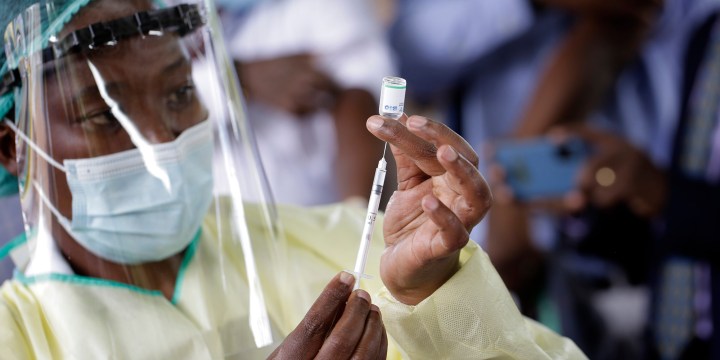OP-ED
Public-private partnerships hold the key to mass Covid-19 vaccinations in Africa

It makes no sense to reinvent the wheel by building a mass vaccination programme from scratch in Africa. We can mount this effort through existing resources and partnerships between health authorities, international brands, leaders, churches, tech companies, even military logistics partners, and all the seasoned HIV, TB and malaria organisations that already know their way around.
Mass Covid-19 immunisation efforts have kicked off in the US, Britain and Europe, and Africa — a key vaccine development site — will soon follow suit thanks to local health authorities and the likes of the international Covax programme and Africa CDC.
However, rolling out mass vaccination efforts does not start and end with the purchase of enough doses. In several African regions, practical challenges demand innovation and leapfrogging through strategic partnerships.
Challenges around vaccine distribution in Africa
The Africa CDC has secured 780 million doses of the Covid-19 vaccine with the aim to vaccinate 60% of the continent’s adult population. This would mean distributing and administering one to two million doses per day for the next 24 months.
The African Union has secured a further 270 million doses of the vaccines for distribution from April 2021. But they are not equipped for mass deployment due to practical challenges, including not having pan-continental data systems readily available to ensure effective tracking and delivery at scale.
Challenges include the fact that Africa has no model for the mass distribution of adult vaccines, let alone those that require below-freezing storage.
Some governments may do their cost-benefit analyses and decide to launch their mass vaccination efforts once other more easily distributed vaccines become available that are not cold chain dependent. This would be more ideal in terms of equitable vaccine distribution to under-resourced, at-risk or hard-to-reach populations. However, it adds time we don’t have.
Finding ways around Africa’s challenges
Having developed and run large-scale health and vaccination programmes through the effective use of technology, we know that to get the Covid-19 vaccine to most of the African population we will need to:
- Find a way for African governments to fast-track regulatory approval;
- Drive public health messaging and mobilisation;
- Create innovative partnership models to manage and track vaccine distribution;
- Learn from and leverage the existing work and implementing partners of Pepfar, the Gates Foundation, the Gavi Vaccine Alliance and others who have vast experience assisting Africa’s public health providers with mass health programmes, and who already have many logistics, distribution, warehousing, technology, last-mile and staff solutions to serve hard-to-reach places; and
- Establish innovative and unusual partnerships with and learn from private sector players who are already trading, communicating and offering services all across Africa.
To expedite regulatory approvals, we’ll need to see if countries have the capability to do this, or if the WHO could provide pre-qualification, or if countries could utilise FDA approvals in the US.
Budget is another challenge. There are many hidden costs. You also need syringes, alcohol swabs, gloves, people, resources, storage and all sorts of programmes for vaccine rollout.
Partnerships and co-funding with the NGO sector, big donors and private companies, as well as brands, can be useful here.
Supply chain logistics are harder when a cold chain is necessary. However, you can find ice cream, beer or frozen foods even in deeply remote parts of sub-Saharan Africa. Why not make use of these distribution networks by partnering with companies such as DHL or Coca-Cola?
The hurdles of community awareness and vaccine-hesitancy can also be addressed with great brand and influencer partnerships, as well as collaborations with community leaders and local organisations.
The last challenge is overall project management, including data collection and information sharing with stakeholders. This is solvable with clever public-private tech collaborations.
Leapfrogging through partnerships
It makes no sense to reinvent the wheel by building a mass vaccination programme from scratch. We can mount this effort through existing resources and public-private partnerships between local health authorities, famous international brands, influencers, leaders, churches, tech companies, even military logistics partners, and all the seasoned HIV, TB and malaria organisations that already know their way around.
Data, AI and cloud-based solutions are key in managing this whole process, and Africa is already very good at using leapfrogging technologies to solve its problems. Why not do this again?
The pandemic is an absolute tragedy, but there is a silver lining: public health authorities can move away from a siloed approach and become much smarter about data management, distribution hacking, partnerships outside of the healthcare bubble, and a hundred other steps in the pandemic management process.
Let’s not waste this crisis before the next one hits. DM
Dr John Sargent is co-founder of BroadReach, a group of social impact businesses focused on harnessing innovation and technology to empower human action. Through Vantage Health Technology they have provided training and support to thousands of healthcare workers who have performed more than six million community screenings on the Vantage cloud platform, in partnership with local health authorities during the Covid-19 pandemic
"Information pertaining to Covid-19, vaccines, how to control the spread of the virus and potential treatments is ever-changing. Under the South African Disaster Management Act Regulation 11(5)(c) it is prohibited to publish information through any medium with the intention to deceive people on government measures to address COVID-19. We are therefore disabling the comment section on this article in order to protect both the commenting member and ourselves from potential liability. Should you have additional information that you think we should know, please email [email protected]"



 Become an Insider
Become an Insider